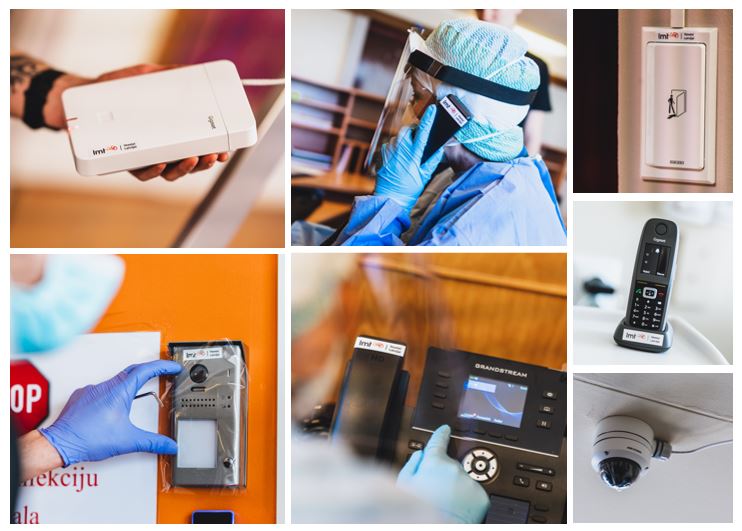LMT has provided over 1000 devices and internet services to the largest hospitals of Latvia and State Emergency Medical Services to support them in their transition to digitization and remote working.
By expanding the array of IT services, hospitals are able to offer qualitative medical services both in-person and remotely, which relieves the strain on medical personnel during the state of emergency.
Along with the rapid spread of the Covid-19 virus throughout the world and Latvia, medical personnel’s everyday working environments have significantly changed. Latvia’s medical system is being reorganized to suit the new pandemic environment and all possible resources are being mobilized to reduce the spread of Covid-19. This includes making it possible to work with patients remotely to protect medical personnel from physical contact and infection.
Latvia’s three largest hospitals – the Riga East University Hospital, the Pauls Stradiņš Clinical University Hospital, and the Children’s Clinical University Hospital – are digitizing their processes and implementing technologies at a high rate. Meanwhile, the State Emergency Medical Service have been delivered communication devices that will be used for a more operative exchange of information for emergency situation management and medical work.
For remote consultations and operative registration, LMT has provided these institutions with both telecommunication services and devices, including laptops, tablets, smartphones, IP telephones in medical wards, webcams for stationary computers, video surveillance and door automation tools, and MiFi devices and routers for remote working – all in all over 1000 devices, connections, and services.
In a time when technologies provide more than ever not only the opportunity for communication and information exchange but also the rhythm of your day, LMT is ready to offer digitalization solutions in every industry. Video technology solutions are an important tool in the everyday lives of medical personnel, but in the conditions of a pandemic they provide another important function – they prevent medic infection, letting them work with colleagues and contact patients remotely. We have previously supported Latvia's largest medical institutions; however, from the vantage point of being a leader in information and communication technologies, we see that there is an opportunity to minimize the risk for the entire Latvian medical system, which must be fully taken advantage of,
emphasizes LMT president Juris Binde.Medical personnel admit that technologies significantly aid them in their work, although often their technical skills exceed the available options. For that reason, providing support to help hospitals meet the technological standards of the 21st century is particularly important.
Along with the Covid-19 outbreak, the everyday lives of medical personnel have significantly changed. The biggest challenges are created by the virus' unexplored nature. Therefore, it's critically important to follow patient developments and changes in their health. Now with the equipment set up by LMT we'll be able to monitor patient's statuses 24/7 while saving personal protective equipment that is necessary for patient care,
says Imants Paeglis, the chairman of the board of the Riga East University Hospital.His opinion is echoed by Rinalds Muciņš, chairman of the board of the Pauls Stradiņš Clinical University Hospital:
Modern technological solutions provide the opportunity for patients to access specialist consultations remotely. That is particularly important during this period when we must strive to minimize the risk of infection for patients and medical personnel. It's possible that the experience gained during this state of emergency could help us work more effectively in the future, after the time of crisis, when remote consultations could be an alternative to direct content with patients in situations where it can provide patients with the necessary medical processes.
The presence of technologies is irreplaceable in the work of the State Emergency Medical Services where a rapid reaction and a coordinated action can save lives.
Operative communication is of immense importance because the current situation is incredibly volatile. There are so many things that must be organized and executed in order for patients to receive the necessary help during the time of a pandemic. They are complex processes, and those responsible, regardless of their location, may be called upon to make important coordinated decisions. A larger role will also be played by our medical personnel's remote communication and the use of technologies for saving the lives of critically ill Covid-19 patients,
comments Liene Cipule, the director of the State Emergency Medical Services.Meanwhile, children’s doctors comment with a smile that thanks to the provided technologies and the opportunity to offer remote consultations, they see many more happy little patients who are not afraid of the doctors because of the distance between them.
In children's medicine, communication with the patient and their parents is of utmost importance, and the opportunities provided by technologies, for example, video calls, make it possible for the doctor to gain a visual to that which is described. A positive side effect is also the saved time, as the hospital is large, operational meetings and councils happen in various rooms, and not always is the doctor able to ensure their physical presence,
says Renāte Snipe, chief physician of the Children’s Clinical University Hospital.She adds that the support from companies like LMT, thanks to whom hundreds of devices have been given to the hospital for remote work requirements, is not only incredibly needed but also incredibly stimulant of the consideration of reducing in-person visits in the future, at least partially, to save patient time and resources that are spent in reaching the doctor, as well as reducing the waiting times in lines.
